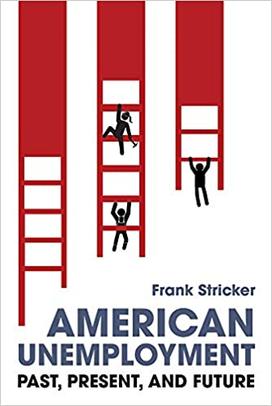Frank Stricker *74 Writes Timely Account of Unemployment in America

American Unemployment: Past, Present, and Future (University of Illinois Press) shows how full employment has rarely been a reality in the U.S., and provides a comprehensive guide with definitions, concepts, and themes to reveal the actualities of unemployment. Stricker goes one step further and also proposes practical solutions to these issues that anyone can understand.
The author: Frank Stricker *74 is professor emeritus of history, interdisciplinary studies, and labor studies at California State University, Dominguez Hills. He is the author of Why America Lost the War on Poverty—and How to Win It. He is a member of the National Jobs for All Coalition/Network and a regular contributor on the organization’s website.

Up until the time I went away to graduate school, I had an excellent part-time job. I was well paid and never laid off. I was the only employee in a painting company and the painter-owner was my father.
After graduate school, it took me a while to find permanent employment. I did not like the job-search process. There weren’t enough jobs and I did not have confidence that I would get a position. And I was struggling to finish my dissertation. I traveled for interviews and presentations to Gary, Indiana, upstate New York, and Ottawa, Canada, where there were two positions at Carleton University. One of the interviewers there told me he was sure I would get the job. I did not. Two friends of mine, one from my pre-college years and one from graduate school, got hired. That worked out okay.
I taught as a visiting professor at UCLA for one year and then was out of work for another. I did some job-searching but found nothing. No unemployment compensation either. I did not know enough to think about whether I could get it. My spouse had a job, but we weren’t affluent. I returned to Chicago to paint houses with my dad for a couple of weeks. Later, my brother hooked me up with a friend who owned a shoe store in Los Angeles, and that man paid me for several days of work straightening out boxes in the back room. I doubt that the work I performed was very important, but I appreciate the kindness. It was a nice thing that the owner did for me.
Late in the summer of 1972, someone told me about a history job at California State University, Dominguez Hills. I had not even heard of the place. I did the interview, people were welcoming, and I secured a position teaching history and labor studies. I kept that job for thirty-five years. I was lucky because around the time I was hired, demand for historians was beginning to sag. After I and one other person were taken on, my department stopped hiring tenure-track faculty for twenty years. I had friends who left the field and others who became freeway flyers, teaching a course here and a course there, and juggling a stack of credit cards to pay their bills. Eventually I earned tenure, but it wasn’t always easy. Budget cuts and layoff threats were regular occurrences, and the threat was dire in 1978 when California’s Proposition 13 slashed property taxes and forced budget cuts. But faculty and administrators organized to save jobs. I was not laid off and for many years I was able to teach United States history, labor history, and courses about unemployment and poverty.
Did I suffer from being unemployed off and on for a couple of years? Not as much as many people suffer from unemployment, but I had experienced enough of it to know I did not want to be unemployed. And I had enough trouble finding a job to understand the role that luck played in people’s employment success. The experience gave me a special interest in thinking about unemployment and poverty.
Review: “A truly accessible explanation of what ails the U.S. economy accompanied by clear explanations of progressive solutions to these problems. I can think of no other book that even tries to cover this ground as comprehensively, with such easy-to-navigate chapters, and such easy-to-understand prose. If you can read a newspaper, you can understand this book. A joy to read, even when you disagree with the author, and a great discussion starter.” — Robert Slayton, author of Empire Statesman: The Rise and Redemption of Al Smith











No responses yet